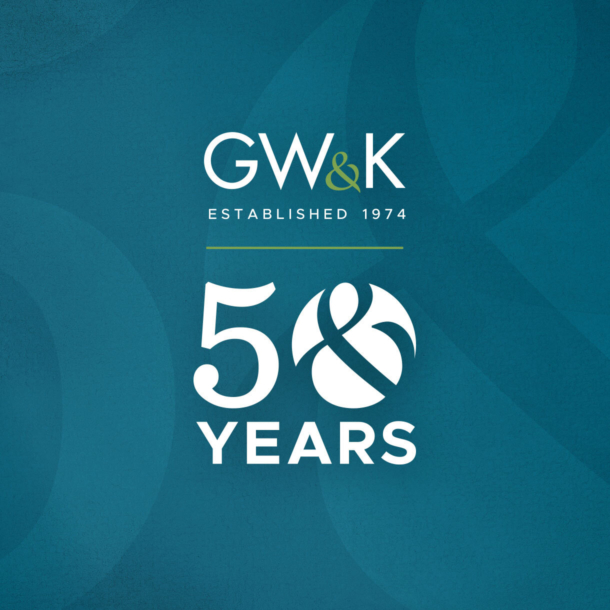
Read from Wealth Strategist, Melissa Jacoby on a few options that may minimize or prevent the need for probate.
Read Article
Global Strategist Bill Sterling shares his latest research on navigating the concentrated US stock market.
Read Article
Hear from employees about what makes GW&K such a special firm and read about some of the milestones on our journey to 50 years of active management.
Read ArticleWe use cookies to improve your experience on our website. To accept cookies click Accept & Close, or continue browsing as normal. For more information or to learn how to opt out of cookies, please see our cookie policy.
Accept and CloseGW&K's CIO and Portfolio Managers share their insights and opinions on the economy and market each quarter.
Firm-wide
Read from Wealth Strategist, Melissa Jacoby on a few options that may minimize or prevent the need for probate.
Read ArticleMunicipal Bond
GW&K’s Director of Municipal Research, Sheila May, writes about the state of California's budget and why we remain comfortable with the state’s credit profile.
Read Article
GW&K Quarterly Investment Review 4Q 2023
ECONOMIC COMMENTARY
As we enter GW&K’s 50th anniversary year, I reflect on my career and the most enduring lessons I have learned and tried to exhibit and teach — the need to be patient and the willingness to endure volatility. An investor does not learn to be patient from earning an MBA or CFA. Quite the opposite.
Given the instant liquidity of stocks and bonds, there is a tendency to make a lot of decisions. It is all too easy to change course, often at the most inappropriate time. In fact, there are few investment approaches over these last 50 years that would not have been successful if investors had practiced patience and accepted volatility.
It has been four years since the Covid pandemic transformed our way of life. Our view of how we want to spend our time, both working and leisure, has altered dramatically. Drastic economic and monetary policies were implemented, some alleviating pain and suffering, others causing it. In these same four years, we have seen profound changes in international policy: a hasty withdrawal from Afghanistan, China’s decision to reverse its economic approach, Russia’s invasion of Ukraine, and Hamas’ attack of Israel. Yet, with all these very difficult events occurring, the markets provided above-average returns.
Now with the 2024 election upon us, the political debate will heat up and lines in the sand will be incredibly divisive. It is hard to get one’s head around all this. How do you stay patient in the face of this real and difficult period of turbulence? Wouldn’t it be easier to walk away from stocks and bonds and put cash under the mattress for the 5% return that is now available?
How can one learn to separate what is happening on the world stage from staying committed to a healthy allocation of investments? The lesson is that there is no other game in town. The 5% will sooner or later be 4%, 3%, 2%, or even 1%. One can’t live and depend on that shrinking cash flow. It just doesn’t work. As I have repeatedly said of the “-ism” of capitalism, it is the one sustaining approach in the world.
In the last two months, returns have been quite dramatic. Long-term government bond yields dropped one full percentage point, from 5% to 4%, in 40 days. The stock market’s broad indices posted double-digit returns, some entering bull-market territory. Of course, the catalyst for this dramatic change was the Federal Reserve signaling its expectation to reduce short-term interest rates in 2024. On the other hand, many structural problems remain, and few see a super healthy economy. But let’s reflect back to the summer of 2020, when the pandemic was impacting our lives. The stock market turned positive even before a vaccine had been produced. Why? Why does the stock market behave so well in the face of obvious concerns?
I believe it is about the human brain adjusting to the changing world. For example, mortgage rates go from 3% to 7%; when they then decline to 6% or 5%, people will be more accepting and start borrowing again. It might take a year or so, but behaviors change to the next paradigm. Employees and employers are finding a new balance between in-office and work from home, all with a comfortable and respectful accommodation. We all have reflected on who we are, what we want in life, and how we are living our lives. This realignment came out of nowhere. Changes like this are often the result of a war’s aftermath, when society is in total upheaval. Maybe Covid was like a war; certainly, too many people died. So now at war’s end life gets redefined for all of us. Amidst all this turnaround, however, the economies of the world continue to chug along.
Take a moment and appreciate the magnificence of this experiment called capitalism. We at GW&K have enjoyed being a quarterback for so many clients these last 50 years. We never went to cash, we never panicked, and we never felt we had all the answers. What we did do is stay connected to our founding belief that if you stay engaged without speculation or leverage, our clients will be able to secure a reasonable return. We as a firm have always been patient and have asked our clients to do the same. It has worked. This partnership between client and advisor, so simple to say, but so challenging to adhere to.
I wish you a healthy and happy New Year, and I hope the concerns and anguish we may be feeling in the moment turn into peace and tranquility.
Harold G. Kotler, CFA
Founder-Chairman, Chief Investment Officer
Harold G. Kotler, CFA
Founder-Chairman, Chief Investment OfficerDisclosures
This represents the views opinions of GW&K Investment Management. It does not constitute investment advice or an offer or solicitation to purchase or sell any security and is subject to change at any time due to changes in market or economic conditions. The comments should not be construed as a recommendation of individual holdings or market sectors, but as an illustration of broader themes. Data is from what we believe to be reliable sources, but it cannot be guaranteed. GW&K assumes no responsibility for the accuracy of the data provided by outside sources.